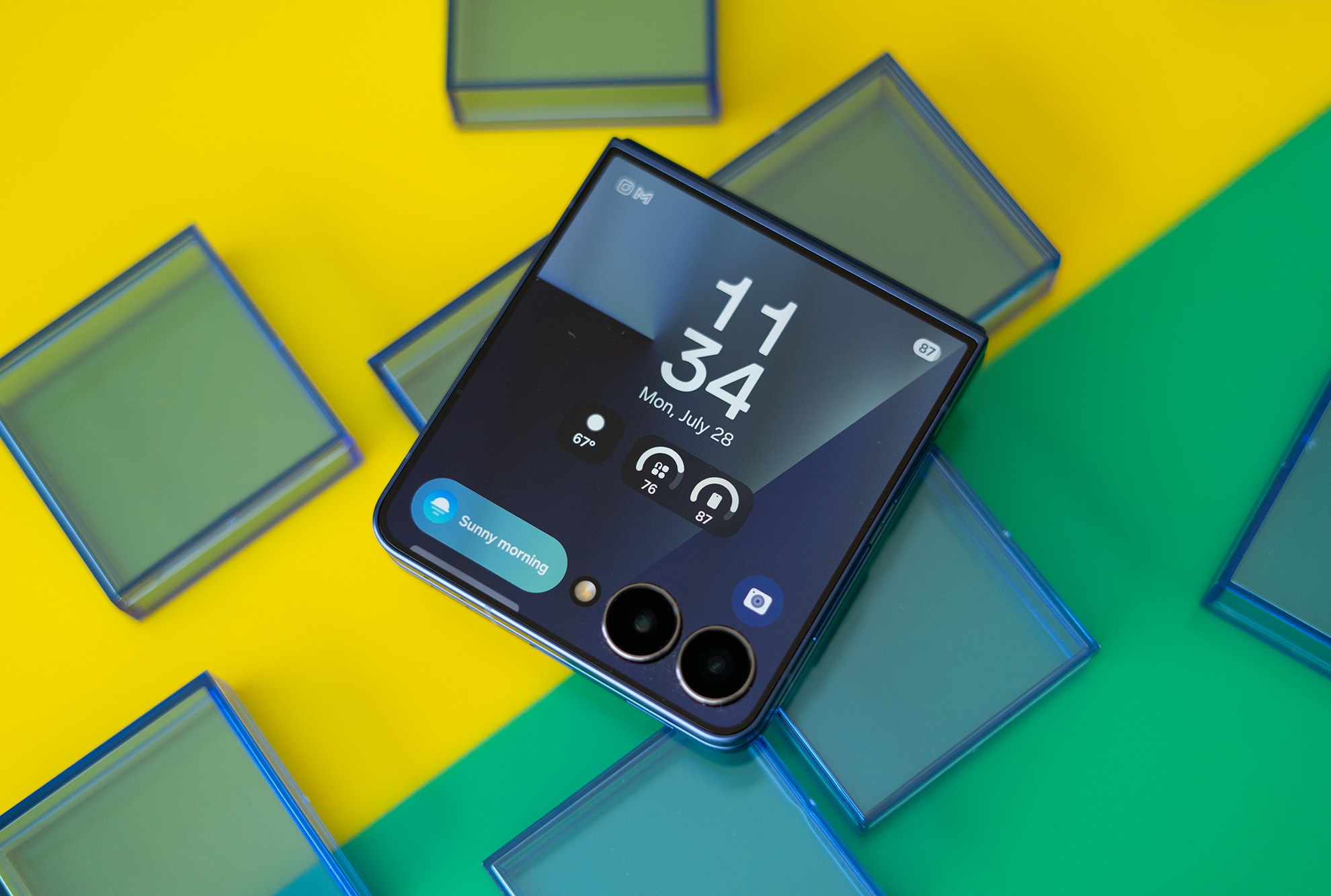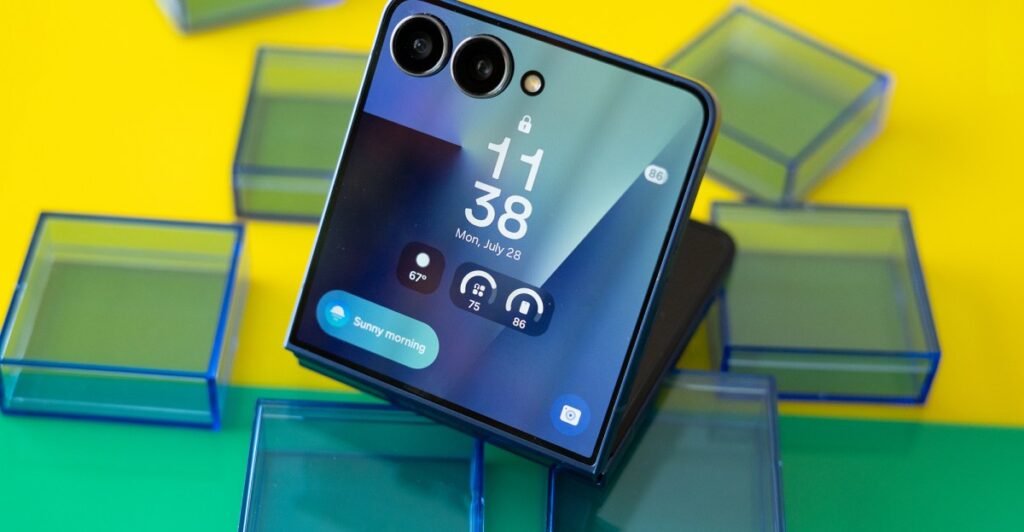It’s the flip phone paradox: if you want to be more mindful about your mobile device usage, you need more screen, not less.
I know. But I swear it’s true: with a bigger cover screen, you get more than just a new way to check notifications. You can actually get shit done. Things that are annoying or even impossible to do on a smartwatch, like sending a text or reading an email, are the perfect candidates for a larger-but-still-small screen. Best of all, you can avoid opening the phone altogether, which is a win for attention spans everywhere.
That’s what makes the $1,099.99 Flip 7 kind of a big deal. It finally offers a proper edge-to-edge screen on the cover. The previous two iterations offered a smaller screen with thick bezels that cut around the cameras, shaped like a file folder. Samsung finally took a cue from Motorola’s all-screen approach, trimming down the bezels and just letting the screen flow around the camera cutouts. Now, the file folder is in the recycling bin where it belongs — at least on the main Flip model. You can still get the previous design for a little cheaper in the Z Flip 7 FE. But with more space for your daily tasks and the option to embrace chaos and run full apps on the cover screen — even at the risk of losing stuff behind the camera cutouts — the Flip 7 is a significant step forward for Samsung’s foldable line.

$1056
The Good
- Samsung finally adopted the big cover screen
- All-day battery
- Reliable camera
The Bad
- More susceptible to dust than your average phone
- Still too hard to run full apps on the cover screen
The cover screen is the biggest update on the Z Flip 7, so that’s a good place to start. With the slimmer bezels and the full-panel display, it’s gone up to 4.1 inches, from 3.4 on the Z Flip 6. By default, Samsung will keep cover screen content above the camera cutouts and use the space next to them to display things like live activities, navigation buttons, and a mostly useless AI summary of your day called the Now Brief. If you’ve opted for gesture navigation rather than three-button nav on the front panel, you’ll see the time and date fill that spot as you swipe between panels. Even using the cover screen this way, which sort of approximates the file folder effect from earlier Flips, there’s still more screen real estate to work with.
Things get more interesting if you let the Z Flip 7 run full apps on the front screen. As it has in the past, Samsung makes you jump through a couple of hoops to do this. You can add an apps widget to the front panel by enabling it as an “experimental” feature, but that only gets you access to a few preapproved apps, like Messages. As Flip phone realheads know, you need to download Good Lock and an extension called Multistar to let any app run on the cover screen. To its credit, Samsung added a shortcut to do this in the settings menu, but this still requires you to understand what “Multistar” is. This is still far too much work, and I don’t understand why Samsung keeps making this difficult when Motorola lets you run any old app on the cover screen without all this rigmarole.
Once you’ve done all this, the real fun starts. I use the Flip 7’s cover screen to glance at walking directions in Google Maps, start and end a bike ride in Strava, respond to texts that would otherwise languish in my notification tray, and punch in my coffee order as I’m running out the door. Doing all this stuff without having to come face to face with everything on my phone feels like a super power, and I always miss it when I switch from a flip phone to a regular one.
Of course, a 4-inch screen isn’t ideal for running modern apps — probably why Samsung makes it so difficult — and sometimes the thing you need to tap is hovering underneath the camera cutout. For these moments, Samsung provides a little icon at the bottom of the screen you can tap to cycle through three window sizes: full screen with content flowing behind the cutouts, everything above the camera lenses, and a teeny-tiny vertical window designed for ants. I was usually able to get to what I needed by tapping through these views, and in the worst-case scenarios I just opened the phone. A little awkwardness is worth it for the freedom of the full cover screen, if you ask me.
Outside of the cover screen upgrade this is a mostly incremental update, aside from two big-ish changes: the switch to a bigger battery, and the inclusion of a Samsung Exynos processor rather than a Qualcomm one. Exynos chips aren’t generally thought to be as powerful as their Snapdragon counterparts, but I didn’t see any noticeable performance hiccups in daily use. I can take a dozen back-to-back portrait mode photos before there’s a pause to clear the buffer. The phone warmed up with 20 minutes of Diablo Immortal gameplay at the highest graphics settings available, and I noticed a little jitter here and there, but nothing serious.
The Z Flip 7 comes with a 4,300mAh battery compared to 4,000mAh in the Flip 6, and in this form factor every bit of capacity counts. It equates to battery performance I’d call a little worse than your average slab-style phone, but not by much. With moderate use I was down between 40 and 50 percent most days, but you can easily push that into less comfortable territory by adding extended hotspot use or graphics-intensive mobile gaming.
Overall, I didn’t come across any unpleasant surprises using the Z Flip 7. The 6.9-inch inner screen is pleasant to use and the crease basically disappears when you look at the phone straight on. It’s a little wider and taller than on previous Z Flip phones, and it feels spacious. Every once in a while it’s a little too eager to turn the brightness down while I’m using it, but this hasn’t been a major annoyance. With the main screen open, it’s easy to forget you’re using a folding phone — until it’s time to stop what you’re doing and snap it shut, which is oh-so satisfying. And let’s not forget the Flip 7’s greatest flex: seven years of OS and security updates, which means you’ll more than likely be done with this phone before it’s done with you, and that’s how things should be.
One thing that might bring your folding phone to its knees before it runs out of software updates? A grain of sand. Like other foldables, the Z Flip 7 comes with an IP48 rating and remains susceptible to dust damage; a teeny-tiny particle in the wrong place could spell doom for that folding screen. To its credit, Samsung has been working on beefing up its repair program to give foldable owners more peace of mind. Its highest-tier extended warranty plan, which costs $18 per month, fully covers broken screens — inner or outer — at no extra cost. Having a solid care policy in your back pocket takes some of the worry out of foldable ownership.
The Flip 7’s cameras are unchanged from the previous model; it’s still a very good camera system. On the rear panel there’s a 50-megapixel main camera that offers a 2x crop mode, plus a 12-megapixel ultrawide; on the inside there’s a 10-megapixel selfie camera. Letting you take selfies with the superior rear camera is still one of the Z Flip’s best tricks, and Samsung continues to deliver a stunning portrait mode when paired with the 2x zoom. Default image processing can be a little crunchy with Samsung’s well-documented tendency to pump up saturation on reds and blues.
But the added versatility of the form factor encouraged me to take more shots than I normally might, and you know what that one guy said about the shots you don’t take. I’m embracing the camera’s flex mode to take candid shots of my 3-year-old. I can keep the camera at a lower angle and still frame up the shot without having to lift the whole phone up in front of my face and give away what I’m doing. If you want to see a 3-year-old make the most unhinged expression imaginable, go ahead and try and take a picture of one with your phone. You’ll see what I mean.
The Galaxy Z Flip 7 is the best version of Samsung’s flip phone to date. The cover screen is more useful than ever, it’s guaranteed seven years of software updates, and it offers a reliable camera system. Whether you want to stare at your phone less or you’re interested in the nostalgia factor, a bigger outer screen is undeniably better. I certainly found myself less likely to get sucked into an impromptu scrolling session when using the Flip. But there is something intangible that Motorola has tapped into with its Razr series that still eludes Samsung.
The Razr makes it easier to take full advantage of the outer screen, lets you have more fun with your cover screen wallpaper, and it comes in a wood finish for Pete’s sake. Samsung took the big cover screen cue from Motorola, finally, but it still needs to learn a few more lessons from its competitor.
Samsung’s been working hard to make the Z Flip 7 feel more like a regular phone, which it has in a number of ways. Battery life is better, the inner screen is a little bigger, and the improved extended warranty helps ease concerns over foldable durability. But I think Samsung could also work on making the Z Flip 7 a better flip phone. Let’s have more fun with the cover screen! Let me run whatever app I want without giving me the runaround! It’s about flipping time.
Photography by Allison Johnson / The Verge
Agree to Continue: Samsung Galaxy Z Fold 7 and Z Flip 7
Every smart device now requires you to agree to a series of terms and conditions before you can use it — contracts that no one actually reads. It’s impossible for us to read and analyze every single one of these agreements. But we started counting exactly how many times you have to hit “agree” to use devices when we review them since these are agreements most people don’t read and definitely can’t negotiate.
To use the Samsung Galaxy Z Fold 7 or Z Flip 7, you must agree to:
- Samsung’s Terms and Conditions
- Samsung’s Privacy Policy
- Google’s Terms of Service (including Privacy Policy)
- Google Play’s Terms of Service
- Automatic installs (including from Google, Samsung, and your carrier)
There are many optional agreements. If you use a carrier-specific version, there will be more of them. Here are just a few:
- Sending diagnostic data to Samsung
- Samsung services, including auto blocker, customization service, continuity service, nearby device scanning, personal data intelligence, and smart suggestions
- Google Drive backup, location services, Wi-Fi scanning, diagnostic data
- Bixby privacy policy (required to use Bixby), plus other options for Bixby like personalized content, data access, and audio recording review
There may be more. For example, Samsung’s Weather app also has its own privacy policy that may include sharing information with Weather.com.
Final tally: there are five mandatory agreements and at least 10 optional ones.
Read the full article here
